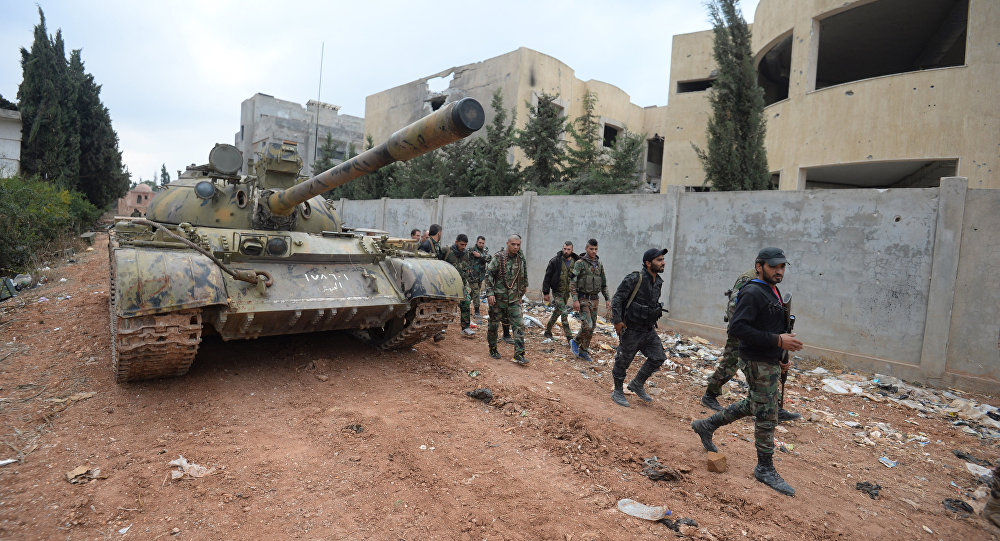
On 20 November 2016, outgoing US President Barack Obama admitted that he is ‘not optimistic about the short-term prospects in Syria’. US imperialism has grounds for pessimism. The Syrian military and their Russian, Iranian and Hezbollah allies continue to make gains against the imperialist-backed armed groups which have plagued Syria with six years of brutal war. The Russian aircraft carrier Admiral Kutznetsov was deployed to the Mediterranean in mid-November, warning NATO off open intervention against the Syrian government. NATO plans for regime change have failed, and with the election of Donald Trump as US President, many commentators insist that a U-turn in US Syria policy is imminent. This may mean a shift in strategy, but US war in the Middle East will continue. However, the military power of Russia, and its growing influence in Syria and the Middle East, is a major challenge to US imperialism and its allies. Toby Harbertson reports.
NATO out-manoeuvred
After a pause of nearly a month, on 15 November the Syrian air force resumed air strikes on eastern Aleppo. This area is largely controlled by the jihadist group Jabhat Fateh Al Sham – formerly Jabhat Al Nusra (JN), an Al Qaeda affiliate. Estimates of the number of civilians remaining in the area range from 30,000-250,000. The Syrian army maintains exit corridors but JN are laying mines to trap civilians in. This has provoked protests – 1,500 took to the streets on 17 November. Protests have been met with machine-gun fire and the executions of organisers (21st Century Wire, 19 November). Syrian forces are retaking key areas of Aleppo, in a bid to eject the insurgency from its last major urban stronghold outside of its eastern capital, Raqqa.
UN Special Envoy to Syria, Staffan De Mistura, accused JN of war crimes in its shelling of government-controlled areas of Aleppo (Guardian, 31 October). Accusations of Syrian and Russian war crimes in Aleppo however, fill the British media – especially the bombing of hospitals. Russian Defence Ministry spokesperson, Major General Konashenkov, explained that the US has refused to provide coordinates of medical facilities in eastern Aleppo. He continued: ‘If we count the number of “hospitals” and “mobile clinics” bombed in Syria over the last year, according to American and especially British sources, one might conclude there were nothing but “hospitals” in Syria’ (Russia Today, 18 November).
NATO is once again being out-manoeuvred by Russia in the international proxy-war in Syria. The Admiral Kutznetsov, the flagship of the Russian Navy, is now launching bombing raids over Syria. Peter Ford, the former British Ambassador to Syria, called its deployment ‘a quantum jump in Russia military capabilities’ in Syria (Russia Today, 15 November). This came at a time when US and British military figures were calling for a ‘no-fly zone’ in Syria, and proposing ‘cratering’ Syrian airfields. The Admiral Kutznetsov cannot be ‘cratered’ without an act of war on Russia. Warships and planes from Britain and other European nations were mobilized to escort the Admiral Kutznetsov through the North Sea and English Channel. Britain and others put pressure on the Spanish government forcing it to prevent the Russian fleet from refuelling in the Spanish-occupied enclave of Ceuta in North Africa.
Trump to lead a policy shift?
Amidst this increasing tension, the unexpected victory of Donald Trump in the US election brought confusion, and speculation of a looming change in US foreign policy. Whilst Hillary Clinton fought the election with rhetoric about escalating the war on the Syrian government, Trump promised to focus the US intervention in Syria on destroying the jihadist Islamic State (IS), praising Presidents Assad and Putin. Trump has pledged to stop US support to armed groups in Syria, much of which has ended up supplying jihadists including IS and JN. De Mistura praised Trump’s priorities (BBC Hardtalk, 15 November). However, most US and European leaders and media have explicitly condemned Trump’s strategy. British Foreign Secretary Boris Johnson – who held similar opinions on Assad and Russia to Trump before he assumed his cabinet role – is due to visit Trump in the next few weeks to persuade him of the need to put Assad’s removal at the centre of his Syria policy (Sunday Telegraph, 12 November).
The initial indications suggest that any policy shift at the top will not give respite to the people of the Middle East. Trump’s new National Security Adviser – Mike Flynn – was the top US intelligence official in the Iraq and Afghanistan wars. He has argued for further US support for Turkey, whose soldiers are illegally in both Syria and Iraq. Independent journalist Patrick Cockburn explains that one member of Trump’s foreign policy team, John Bolton, has been ‘advocating a war with Iran since 2003’, and ‘proposes carving out a Sunni state in northern Iraq and eastern Syria … As a recipe for deepening the conflict in the region, it could scarcely be bettered.’ (18 November). Trump is reported to have plans to expand the US military. His unstinting support for Israel will force him towards protecting its regional interests.
Obama’s government, supported by its NATO and Middle-Eastern allies, will do all it can in its final weeks to tip the balance against Assad’s government and Russia. The assault on Mosul, an IS stronghold in Iraq, launched by Iraqi, Kurdish and US forces in late October, will drive thousands of IS militants into Syria. On 21 November, surface-to-air missiles reached rebels in Syria for the first time, suggesting that the US prohibition on such weaponry has been relaxed, or that Saudi Arabia and Qatar have now decided to ignore it (Middle East Eye). Trump will be taking his place at the heart of the world’s most powerful military machine, which is currently engaged in wars in Syria, Iraq, Afghanistan, Pakistan, Somalia, Yemen, and elsewhere across the Middle East and Africa, surrounded by a top team of proven imperialist warmongers. Only a struggle against imperialism can win peace in the Middle East.




